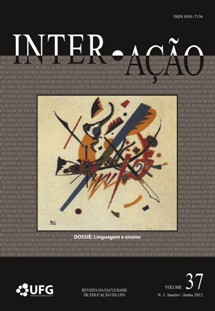O CONTRATO DE COMUNICAÇÃO NA SALA DE AULA
DOI:
https://doi.org/10.5216/ia.v37i1.18861Resumen
Não se pode reduzir o ato de comunicação a uma relação simétrica entre um emissor e um receptor; é necessário analisar as condições em que os sujeitos falantes reconhecem este direito recíproco de falar e construir sentido, para que o ato de comunicação se realize. Isso se dá em uma troca linguageira em que os parceiros reconhecem mutuamente o direito à palavra, ou seja, ambos entram em um contrato em que as partes buscam princípios, pertinência, influência e regulação comuns. Em uma situação de sala de aula, os parceiros contratam sua interação, de forma a construirem suas identidades, finalidades e papéis, para que os sentidos possam ser o resultado do ato de comunicação.Descargas
Descargas
Publicado
Cómo citar
Número
Sección
Licencia
A Inter-Ação utiliza como base para transferência de direitos a licença Creative Commons Attribution 4.0 para periódicos de acesso aberto (Open Archives Iniciative - OAI). Por acesso aberto entende-se a disponibilização gratuita na Internet, para que os usuários possam ler, baixar, copiar, distribuir, imprimir, pesquisar ou referenciar o texto integral dos documentos, processá-los para indexação, utilizá-los como dados de entrada de programas para softwares, ou usá-los para qualquer outro propósito legal, sem barreira financeira, legal ou técnica.
Autores que publicam neste periódico concordam com os seguintes termos:
1) Autores mantém os direitos autorais e concedem à revista o direito de primeira publicação, com o trabalho simultaneamente licenciado sob a Licença Creative Commons Attribution que permite o compartilhamento do trabalho com reconhecimento da autoria e publicação inicial nesta revista.
2) Autores têm autorização para assumir contratos adicionais separadamente, para distribuição não-exclusiva da versão do trabalho publicada nesta revista (ex.: publicar em repositório institucional ou como capítulo de livro), com reconhecimento de autoria e publicação inicial nesta revista.
3) Autores têm permissão e são estimulados a publicar e distribuir seu trabalho online (ex.: em repositórios institucionais ou na sua página pessoal) a qualquer ponto antes ou durante o processo editorial, já que isso pode gerar alterações produtivas, bem como aumentar o impacto e a citação do trabalho publicado.















